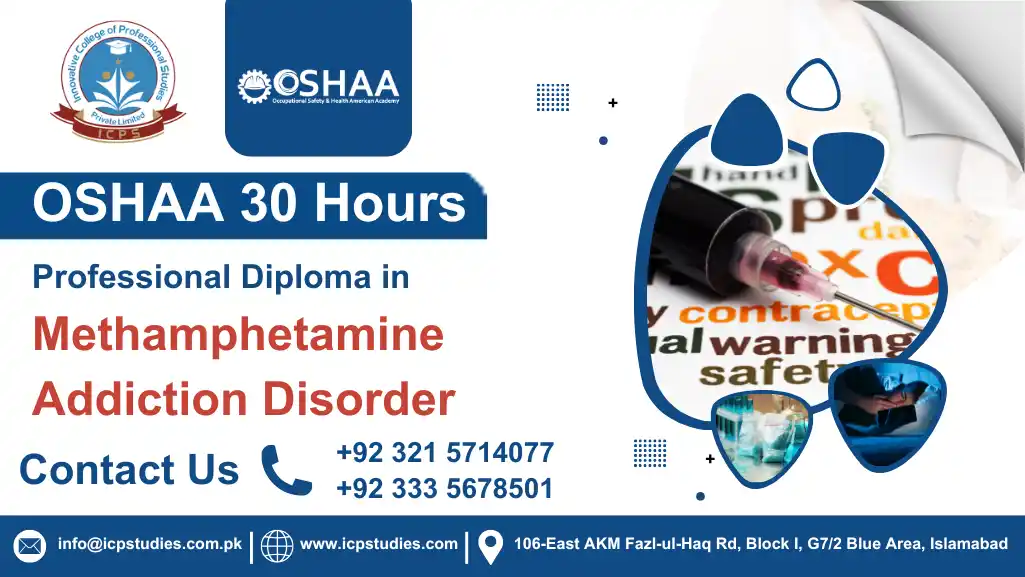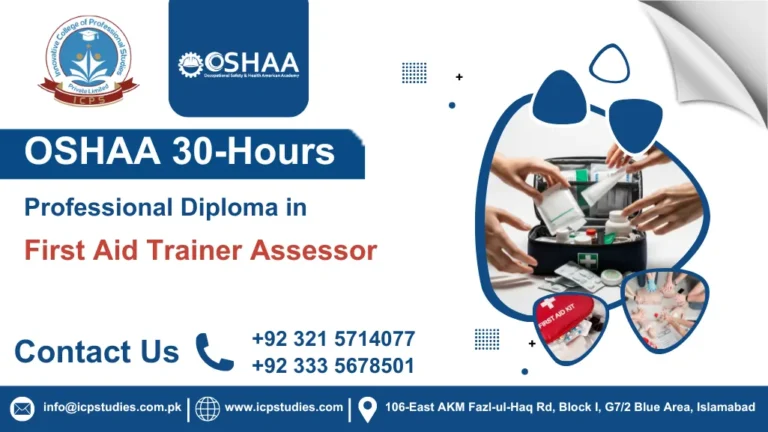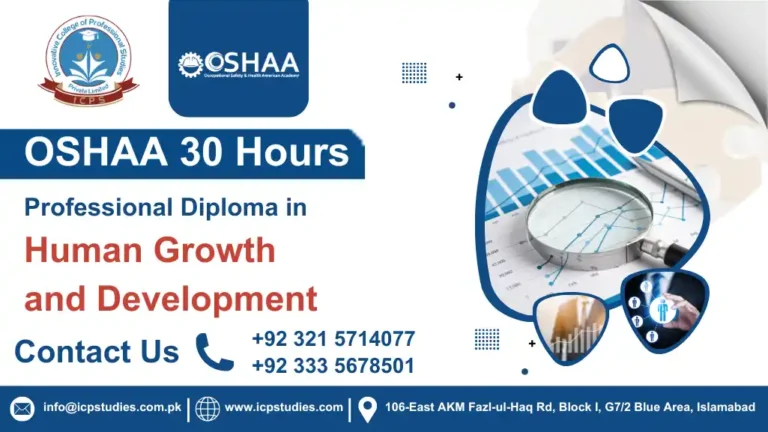The OSHAA 30-Hours Professional Diploma in Methamphetamine Addiction Disorder is a professionally structured and internationally relevant training course aimed at addressing one of the most critical public health challenges today. This diploma has been carefully designed for professionals and aspiring individuals who wish to gain in-depth knowledge, practical skills, and clinical insights into the complexities of methamphetamine addiction. Methamphetamine use is a growing concern worldwide due to its severe physical, mental, and social consequences. This diploma provides a comprehensive understanding of addiction, treatment models, rehabilitation strategies, and prevention techniques according to modern evidence-based practices.
The OSHAA 30-Hours Professional Diploma in Methamphetamine Addiction Disorder programme spans 30 hours of detailed theoretical learning and applied understanding. The course is particularly suited to those in healthcare, social work, addiction counselling, law enforcement, or anyone engaged in supporting individuals struggling with methamphetamine addiction. It addresses the biological, psychological, and social dimensions of the disorder while emphasising recovery and harm reduction. This training is delivered in line with UK professional and academic standards, making it a globally recognised qualification in the field of addiction care. With a flexible learning format and accessible content, the programme is suitable for both working professionals and new learners.
The OSHAA 30-Hours Professional Diploma in Methamphetamine Addiction Disorder is more than a certificate – it is a professional commitment to supporting individuals, families, and communities affected by addiction. This diploma is an ideal choice for those who are passionate about making a positive impact in the field of mental health and addiction recovery. Whether you’re looking to enhance your current role or step into a new career in addiction services, this OSHAA 30-Hours Professional Diploma in Methamphetamine Addiction Disorder delivers the critical knowledge and hands-on skills needed to make a difference. It combines academic rigour with practical relevance, ensuring you are prepared to face real-world challenges in dealing with methamphetamine-related disorders.
All About OSHAA 30-Hours Professional Diploma in Methamphetamine Addiction Disorder
Course Overview
The OSHAA 30-Hours Professional Diploma in Methamphetamine Addiction Disorder is a comprehensive training programme designed to equip learners with the knowledge and skills required to understand and address methamphetamine addiction effectively. This course focuses on the psychological, physical, and social impact of methamphetamine use, offering a detailed exploration of the causes, consequences, and evidence-based treatment approaches for addiction.
Structured to meet international and UK professional standards, the diploma is ideal for healthcare professionals, social workers, counsellors, and individuals involved in public health or community support. It combines theoretical understanding with practical application, ensuring that learners can confidently assess, support, and manage individuals affected by methamphetamine use.
Through engaging study units and expert-led instruction, participants gain a deep insight into addiction science, behavioural therapies, harm reduction strategies, and relapse prevention planning. This course prepares professionals to respond compassionately and effectively to one of the most challenging substance abuse issues in today’s society.
Upon completion of the OSHAA 30-Hours Professional Diploma in Methamphetamine Addiction Disorder, learners will be well-positioned to pursue further qualifications in addiction counselling or related fields, or apply their new skills in various clinical, community, and outreach settings.
Study Units
- Introduction to Methamphetamine Addiction
- The Neurobiology of Methamphetamine and Its Effects on the Brain
- Identifying the Signs and Symptoms of Methamphetamine Addiction
- Psychological and Social Factors in Methamphetamine Addiction
- Treatment Approaches for Methamphetamine Addictioz
- Behavioural Therapies for Methamphetamine Addiction
- Cognitive Behavioral Therapy (CBT) and Contingency Management
- Managing Relapse and Supporting Long-Term Recovery
To ensure the course is accessible yet professionally relevant, applicants are required to meet the following entry criteria:
Minimum Age
Applicants must be at least 18 years of age at the time of enrolment.
Educational Background
No formal academic qualifications are required; however, a basic secondary school education or equivalent is recommended for ease of understanding course materials.
Work Experience
While prior experience in healthcare, social work, counselling, or related fields is beneficial, it is not mandatory. The course is suitable for both beginners and professionals looking to enhance their knowledge.
Language Proficiency
A basic level of English language proficiency in reading, writing, and comprehension is required, as the course content and assessments are delivered in English.
The OSHAA 30-Hours Professional Diploma in Methamphetamine Addiction Disorder is designed for a diverse group of individuals who are either currently working in or aspiring to enter the field of addiction support, mental health, or community care. This course is well-suited for:
- Healthcare professionals seeking to expand their expertise in substance misuse and addiction disorders
- Social workers and rehabilitation staff working with vulnerable populations
- Counsellors and therapists aiming to specialise in methamphetamine addiction
- Law enforcement and correctional officers dealing with drug-related cases
- NGO workers and volunteers involved in community outreach and support services
- Teachers, youth mentors, and community leaders who want to support at-risk individuals
- Students or graduates of psychology, public health, social sciences, or nursing fields
This diploma is ideal for anyone committed to understanding and addressing the complex nature of methamphetamine addiction, and for those who want to play a proactive role in prevention, intervention, and recovery support.
Learning Outcomes
Introduction to Methamphetamine Addiction
- Understand the nature and prevalence of methamphetamine use
- Identify key risk factors contributing to methamphetamine addiction
- Recognise the impact of methamphetamine abuse on individuals and communities
The Neurobiology of Methamphetamine and Its Effects on the Brain
- Explain how methamphetamine affects the central nervous system
- Describe changes in brain structure and function due to prolonged use
- Analyse the link between brain chemistry and addictive behaviours
Identifying the Signs and Symptoms of Methamphetamine Addiction
- Detect physical, behavioural, and emotional indicators of methamphetamine misuse
- Differentiate between early, moderate, and severe stages of addiction
- Understand the diagnostic criteria for methamphetamine use disorder
Psychological and Social Factors in Methamphetamine Addiction
- Explore the influence of mental health, trauma, and stress on addiction
- Examine the role of family, peer pressure, and socio-economic conditions
- Assess the impact of addiction on relationships, employment, and lifestyle
Treatment Approaches for Methamphetamine Addiction
- Identify various treatment settings, including inpatient and outpatient care
- Evaluate medical, therapeutic, and holistic intervention strategies
- Understand the role of detoxification and stabilisation in the recovery process
Behavioural Therapies for Methamphetamine Addiction
- Learn the principles of evidence-based behavioural treatment models
- Apply motivational interviewing and other engagement techniques
- Support behaviour change through structured intervention plans
Cognitive Behavioral Therapy (CBT) and Contingency Management
- Understand the use of CBT in managing addictive thoughts and behaviours
- Apply contingency management strategies to reinforce positive change
- Develop practical tools to help clients avoid triggers and high-risk situations
Managing Relapse and Supporting Long-Term Recovery
- Identify common relapse triggers and warning signs
- Create effective relapse prevention plans and support networks
- Promote sustainable recovery through ongoing counselling and community support
FAQs OSHAA 30-Hours Professional Diploma in Methamphetamine Addiction Disorder







